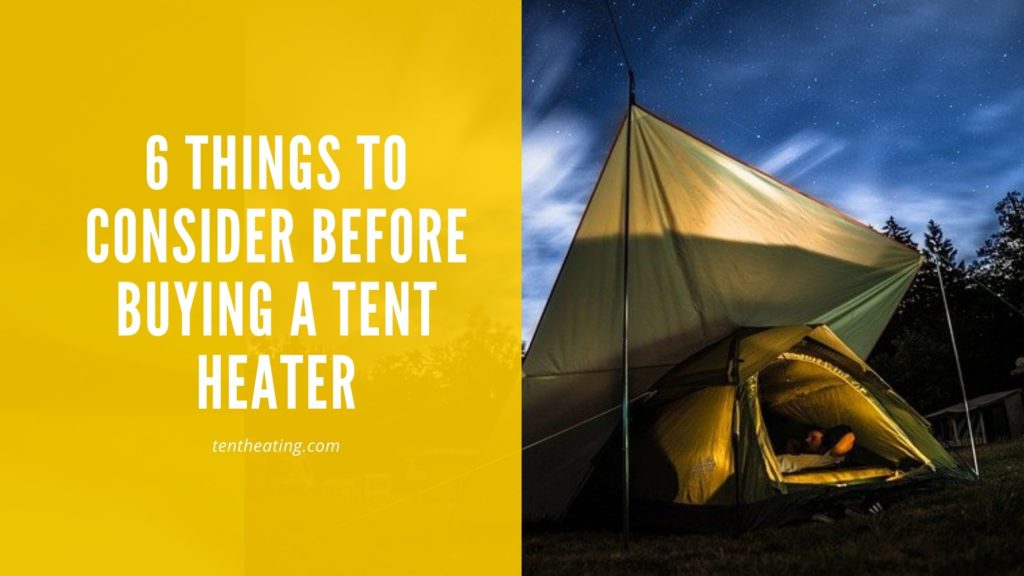Although camping provides a beautiful escape from congested cities and the pressures of daily life, the independence it offers Normally comes at the expense of giving up the bulk of our creature comforts.
Unlike me, You probably hate that moment in which cold nights and freezing tents can ruin your ideal camping experience.
Tent heaters offer a variety of additional benefits in addition to providing ambient heat in enclosed spaces. Using a tent heater reduces the need to pack as many heavy layers of clothing and a bulkier low-temperature-rated sleeping bag, making your cold-weather camping loadout lighter and smaller. Even better, these portable heaters allow campers to extend their camping season rather than having to put up their tents when the snow starts to fall.
In this tutorial, We’re going to give you 6 Things to consider before buying a Tent Heater– Buying Guide and focus on a few critical safety issues as well.
Usage of the Heater:
The first thing you need to remember when trying to find the right camping tent heater is how you plan to use it. There are several forms of camping. You intend to camp out of a tent, from an RV or a cabin-campground?
If you need a heater for the trail, You’ll want something dependable. When you’re out in the wind, you’ll probably need a heater that runs on diesel rather than electricity.
An electric heater is a safer choice if you have access to electricity, whether it’s running through a battery, solar panels, or just an outlet connected to a pole.
Electric or Propane Heater:
Now it’s time to look at the two most common types of camping heaters. An electric or propane heater can keep you warm throughout the winter, but all have distinct advantages and inconveniences, irrespective of where you pitch your camp.
- Electric Tent Heaters
An electrical heater can come in all types and sizes, including models with remote controls or oscillating. Since they are made of plastic and have a ceramic heating system in them, they are lightweight.
Another advantage is its price. You can easily buy a high-end electric heater at the same price as a mid-range propane heater. The electric heater has no problem with open Fire and also with carbon monoxide. From this point of view, they sure are better to use.
Unfortunately, you’ve got to get batteries to have an electric heater, which automatically prevents it from being seen by several campers. Even if you have access to electricity where you’re planning a walk, this type of heater can be hard to pack despite being lightweight.
- Propane Tent Heaters:
When you need portable heating on the trail, the propane heater is usually the best choice. Some versions can operate at high altitudes, and most of them are build to pack comfortably and take up very little room in your pack or car.
It is also not rare to see versions that can use to prepare food and heat a tent. Having a dual-purpose device outside your tent is a plus, even though the fuel itself may be a problem. Outside of apparent safety issues, the main downside of the propane heater is the fuel tanks. it can take large space.
Tent Heater Output
If you’ve got a decent idea of the heater type that’s perfect for your camping trip, it’s time to think about the performance relative to the size of your tent. The specification you’re searching for is called BTU, better known as the British Thermal Units. You will read more about BTU in our tutorial, but you won’t have to make any complex calculations for a tent heater.
Manufacturers that make heaters and fans also give product ranking. However, they still provide a square footage rating, and it is what you have to check. Unfortunately, the tents are not the same height, so you need to multiply the length and width of one side of your camping tent.
A 6-person dome tent that is 10 x 10 would be 100 square feet and need a comparatively small heater. You will technically heat an area of that size with the small Buddy propane heater. But also have to think about ventilation and the types of tent you have got.
Size and Weight
Whether you’re packing light for a ride up a mountain or camping out of your car with a tent, the size of the heater matters the most. Most of us don’t have the luxury of having unlimited space on a scamping tour, So The size and weight of a heater must consider before buying.
In our experience, many of the heaters used for camping tents weigh about 2-4 pounds. They’re not as light as a camping stove, because if you’re using propane or butane, you’ll have to add in the fuel source’s weight as well. Electric models are typically heavier, but they do not require additional accessories to carry. As for which one is easier to pack, it all depends on you.
Safety Features
Camping heaters are not complex tools to use, Although some electrical versions can be very high-tech. However, all types of heaters have the same amount of protection features which can be one of the first things you’re looking for when buying a heater for your adventure.
If the heater has an open fire or is propane-based, an ODS sensor is needed. This is often a typical feature for vent-free heaters and is usually found on small propane systems also. If the oxygen level in a neighborhood drops below a particular percentage, the sensor kicks in and shuts the fuel off.
Auto-shutoff functionality is a must for any fuel-powered heating system, and depending on style, they may use a tip-over-switch. If the name means, whether the heater is kicked off the bottom activation switch and the heater is turned down. Electrical heaters with overheat protection are the most expensive.

